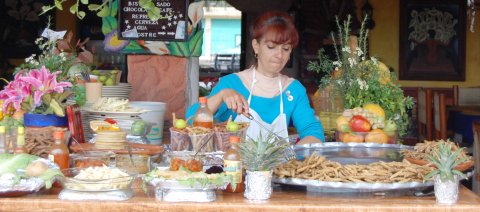Michoacán Cuisine
Michoacán’s fertile and varied lands bring an abundance of fruits and vegetables to its table. From the northern parts of the state com such staples as onions, chile and tomatoes as well as potatoes, strawberries, blackberries, and apricots. From the southern Sierra come more fruits: watermelon and oranges, melon and papaya. The coast yields coconuts and mango in abundance. Mix this fresh local produce with corn and beans, and the possibilities multiply almost exponentially. Some recipes are typical of a specific area but you should be able to find many of these dishes in restaurants throughout the state. Below is a cheat sheet of some of the region’s best-loved dishes. Aguácata: A large bread roll shaped like an avocado Aporreadillo: A slightly spicy beef stew typical of the lowlands, sort of like machaca but with broth. Atapakua: A thick savory sauce served over beef or cheese Ate: Blocks of candied fruit served with a tart white cheese to cut the sweet. Atole blanco: A warming drink made of finely ground cornmeal flavored with anise and chile Atole de pinole: Atole made with raw brown sugar in addition to the cornmeal Carnitas: Michoacan’s succulent carnitas are highly praised throughout the country. These are tender bites of steamed and fried pork served with a stack of tortillas and freshly made salsa, or as a filling for tacos. Chaqueta: Atole flavored with toasted and ground cacao husk. Charales: Small fish, similar to minnows, dried and served as snacks. Corundas: Triangle-shaped tamales with a sliver of pork inside, wrapped in green corn husks and steamed. A favorite food of Purépecha kings, and today a popular morning snack. Churipo: Beef and red chile broth with vegetables Gaspacho: Sold primarily in Morelía, it’s a fruit salad with cucumbers and spiced up as the customer likes it with lime, chile, salt, or even cheese. Gorditas: Cornmeal cakes stuffed with black beans and deep-fried; topped with shredded cabbage, onions and salsa. Olla podrida: The name means “rotten pot.” This is a stew of European origin made of mixed meats and vegetables, with a New World touch: pulque, a rather viscous alcoholic beverage. Paletas y Nieves: Michoacán is famous for its creamy ice cream; Paleterías “La Michoacana” are found all over Mexico! Nieve de pasta is typical of Patzcuaro, it has a mild flavor similar to vanilla or dulce de leche. Pescado Blanco: Where have all the whitefish gone? According to rumor, a bonehead biologist put carp in Lake Patzcuaro and they ate up all of the whitefish eggs. You can still get the tiny white fish, served battered and deep-fried, but they now come from Lake Zirahuén. Pozole: Pork and hominy soup (red and white versions) Queso Cotija: This crumbly white cheese prized throughout Mexico is made right here in Cotija, Michoacán. Ponteduros: Toasted corn snacks coated with brown sugar Sopa Tarasca: A tomato-based soup with chicken garnished with fried tortilla strips and a little cheese. The recipe was concocted in Patzcuaro. Uchepo: A tamale made with early corn, it can be sweet or savory.
|









